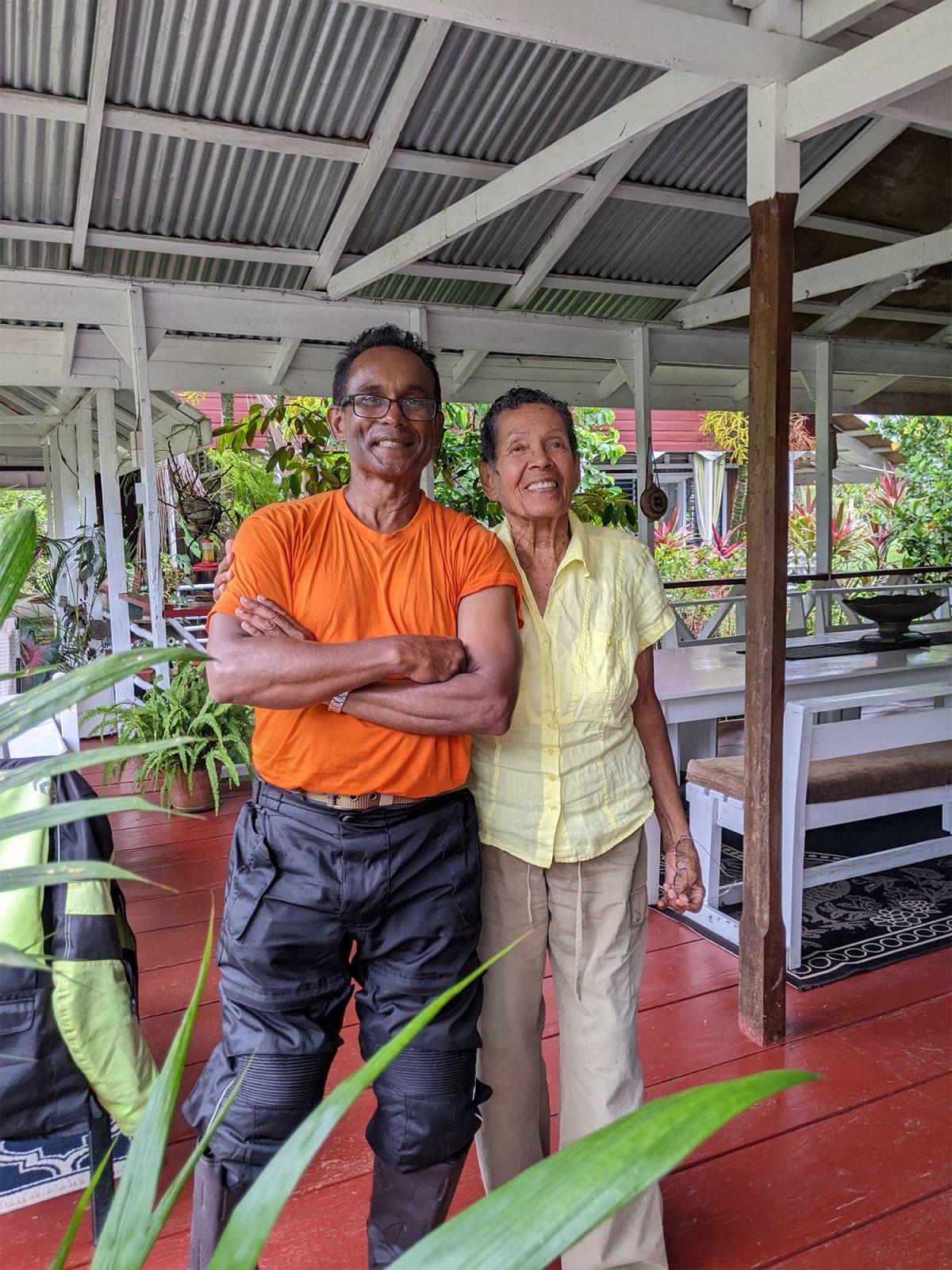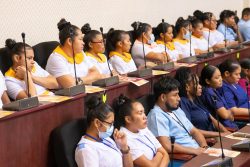Of all the accomplishments that are linked to the Adel Rainforest Resort at Pomeroon, the owner, Zena Stoll is probably proudest of the establishment’s cuisine. Once we arrived there she lost no time in regaling us with stories about its menus. Hers is what she calls an organic menu…its continuity interrupted by the intervention of the COVID-19 pandemic and the floods of 2021 and 2022, which decimated 90% of the fruit and vegetables that were so critical to her culinary offerings. The recovery effort is still very much extant at this time. She has begun to re-plant and is seeing progress.
Arriving at Adel’s Rainforest Resort is, in itself, an interesting experience. The facility is situated at the mouth of the Akawini Creek, half an hour’s boat ride from Charity. However preoccupied we may be about our oil bonanza, we are unlikely to ‘go places’ globally except the country as a whole becomes more mindful of its environmental responsibilities. The pockets of garbage (mostly coconuts, plastics and food boxes) bobbing about at various points in the Pomeroon River amounts to a national disgrace in a wider world in which the preservation of the environment is close to the top of the global ‘to do’ agenda. This is not something that we have to live with. Apart from being decidedly ugly these pockets of refuse can cause accidents that could take lives. It would do little harm for the authorities to undertake a ‘PR Pitch’ on this issue.

The boat left Charity on the Pomeroon River heading to Akawini Creek. The procedure, thereafter, was not unlike a minibus ‘drill.’ Passengers would point to a particular landing and asked to be ‘put off’ there. That would take them within walking distance of their actual destinations. As the boat turned into Akawini Creek, I had my first glimpse of Adel’s Resort. A brightly painted red and white landing and a decidedly attractive flower garden were my ‘markers’ at the front of the buildings. The boat driver cooled my enthusiasm to get my feet on dry land. He cautioned me that the area was populated by vicious dogs that did not always take well to strangers. I took his word for it and waited on the landing. Zena Stoll, or ‘Aunty Zena’ to the community, the Proprietrix of the Resort came to the landing to greet me, enthusiastically, as though we were old friends. Six decades of a routine of rising, dressing and going to work had left her stuck with the habit in her 80s, her ‘golden years’ as she puts it, she is clearly still acutely mentally alert and physically able.
Adel’s Resort is run by a salaried General Manager and seven other employees. Aunty Zena’s primary preoccupation is with her farm-to-table culinary offerings. Beyond this pursuit she shares her time between the Resort and her grandchildren residing overseas. Adel’s Resort sits on a sixty-acre plot, ‘fits’ three 40 X 40 buildings and a roughly thirty acre farm. One of the three buildings serves as a ‘throw back’ zone. The place is ‘littered’ with comfortable chairs and rugs. Another building accommodates the kitchen and dining areas has relaxing chairs with cushions. There are eight rooms which can accommodate about twenty people. Another area is crammed with books and a hammock. Aunty Zena lays claim to having designed this particular setting. A career in the British Guiana Civil Service that would have otherwise ended in retirement long ago, was truncated by her marriage to Patrick Westmaas. The union led her to migration to the United Kingdom
After several years of working in the United Kingdom, she decided to move to the United States. She took advice given her to enter a College in the USA immediately. She decided to attend New York University and pursued a course in Administrative Tourism. The cost was six hundred dollars and she had to pay it in six weeks. Meanwhile, she secured a job as a server at Child’s Pancake House, a Jamaican establishment. At a much earlier time her family had owned an 800-acre Coconut Estate at Akawani, it was this that provided her with the impetus to become a business owner in her own right. Afterwards, the Tourism Bug ‘bit’ her. Fiji? She was not impressed with the beaches. Afterwards, she met Winter Crawford, who owned a Hotel in Barbados. That was her entrée into the Hotel and Hospitality Industry. Just as the lease for her earliest facility was nearing an end the Golden Sands Apartments in Christ Church was up for sale.
She flew to Guyana, borrowed money from her father and plunged headlong into the Golden Sands project. She ran the facility for fifteen years. It was a challenge. Most of the guests were from Europe and North America. The winter months were good; 100% occupancy. The remaining weeks, she says, were “terrible.” During those good weeks she ensured that her debts were paid. The Golden Sands boasted twenty-seven apartments. These were reserved for overseas travel agents who made their money mostly during the winter months. These were distributed in batches of six to the respective agents. The travel agents had to deposit a bond to the Barbados Tourism Authority who would also organize road trips. Barbados was an enjoyable experience but she found it hard to resist the ‘moving on’ bug. Around 1997, she established a School Boat service for children in the Akawini area of the lower Pomeroon. That project anchored her here…..somewhat.
Her next project was a fund-raising initiative in Washington to purchase a boat for post-Grade six children who had secured places to attend the Charity Secondary and 8th of May School on the Essequibo Coast. Finally, following yet another ‘adventure,’ in Grenada, she ‘sold out’ and moved to her family estate. This was the beginning of Adel’s Resort. The land has been in her family’s possession for more than 100 years. It had been willed to Adele Stoll, Zena’s paternal grandmother. Zena had departed Akawini for Georgetown after several years and left the land to one of her sons. It was left unattended for more than forty five years. When she returned in 1992 the property was a jungle. It had been unoccupied for more than forty years. She proceeded to have the land surveyed and to cut the trees to make way for construction and she decided to leave an indigenous ‘mark’ on the property. The roof was created from ‘Troolie’ Palms.
The Lodge, the Proprietrix says, is decidedly eco-friendly. Guests enjoyed fruit and vegetables from the farm. Okra, Avocadoes, Plantains, Banana, Citrus and Cashew are among the fruit and vegetables cultivated in the garden. Some of the dishes which she prepares for her guests are ‘blasts’ from her ‘past.’ The Plantain Rice from Honduras is one of her favourite dishes. She thoroughly enjoys watching the guests eating Plantain Rice with ‘their eyes.’ Desserts usually include stewed guava, or watermelon with guava. The drinks are all fruit-based, while guests are free to bring their own liquor. There are Day Tours too that ‘take in’ the farm and the coconut estate. Overnight guests can benefit from visits to Wakapoa, an Amerindian settlement, a one-hour boat ride away from Adel’s.
The racket of the parrots and the hum of boat engines send a message the morning has come. The farmers in the community are already heading for their farms; children are making their way to school. At that time of day, if you’re lucky, you may spot a sloth swinging lazily from a tree. Adel’s Resort has played host to visitors from Europe, North America, the Caribbean, overseas-based Guyanese, private and public sector workers, government officials, and local and overseas-based diplomats. The Resort boasts 24-hour electricity and a reliable internet. An investment is underway in the erecting of a 100ft Wi-Fi tower.
Much has changed over the past three years. Between then, flooding and the pandemic had destroyed her farm, inflicting considerable financial loss. She is in the process of replanting banana and plantain suckers, pineapple, squash, and pumpkin and other fruit and vegetables. What she cultivates had always been sufficient to meet the needs of the kitchen. COVID had ‘served up’ some her biggest challenges. Drastically reduced income meant that she had to ‘dig deep.’ In order to retain the staff she had no choice but to keep the Resort going. In this regard she is eternally grateful for the support of her daughters. Nor is she naïve about the likelihood of further challenges. When you contemplate her countenance, however, you are under no illusions about her staying power.









